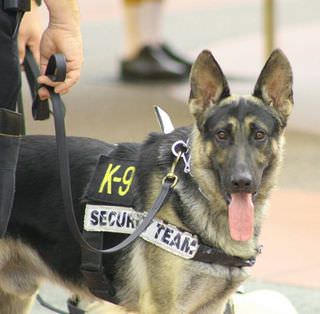
In a 6-3 decision, authored by Associate Justice Ruth Bader Ginsburg, the United States Supreme Court on Tuesday held in Rodriguez v. United States, that, absent reasonable suspicion, police extension of a traffic stop in order to conduct a dog sniff violates the Fourth Amendment protection from unreasonable seizures. The decision may have significant consequences in lessening the volume of drug cases resulting from run-of-the-mill traffic stops because, in most cases, police are not equipped to conduct a dog sniff without adding to the length of the stop.
In 2005, in Caballes v. Illinois, the Court had held that a dog sniff conducted during a traffic stop was not unconstitutional. The facts underlying the present case are different from those in Caballes in that, here, the police extended the duration of the traffic stop to allow for the arrival of the K-9 Unit.
Rodriguez had been pulled over for a simple traffic violation; the officer observed him swerve over the shoulder of the highway. The officer wrote Rodriguez a simple warning. Nevertheless, Rodriguez was not free to leave. The officer instructed him to turn off the ignition, exit the vehicle, and stand in front of the car while they waited for a second officer to arrive so that a dog sniff could be conducted. That officer eventually arrived, and, on the second pass around the car, the animal alerted the officer to the presence of a large bag of methamphetamine. In all, a total of eight minutes passed between the written warning and the positive sniff.
The 6-member majority likened a traffic stop to a “Terry Stop,” and not a formal arrest. It is a relatively brief encounter whose legitimate duration is determined by its purpose. The majority stated that “because addressing the infraction is the purpose of the stop, it may last no longer than is necessary to effectuate that purpose.” In this case, authority for the seizure ended when the written warning was provided. In determining the reasonable duration of the stop, the majority found, “it is appropriate to examine whether the police diligently pursued the investigation.”
Justices Thomas, Alito, and Kennedy dissented, in an opinion authored by Justice Thomas, who believed that the decision was inconsistent with Caballes, and that, in any event, reasonable suspicion existed for the dog sniff. Justice Alito, in a separate dissenting opinion, further commented that “[t]his is an unnecessary, impractical, and arbitrary decision,” and further stating (in parentheses) “(I would love to be the proverbial fly on the wall when police instructors teach this rule to officers who make traffic stops.)”
This case has the potential to immediately call into question many recent police encounters. To discuss how this case may effect your case, contact a Fairlie & Lippy attorney today.


















Or contact me privately:
steve@fairlielaw.com
(215) 997–1000